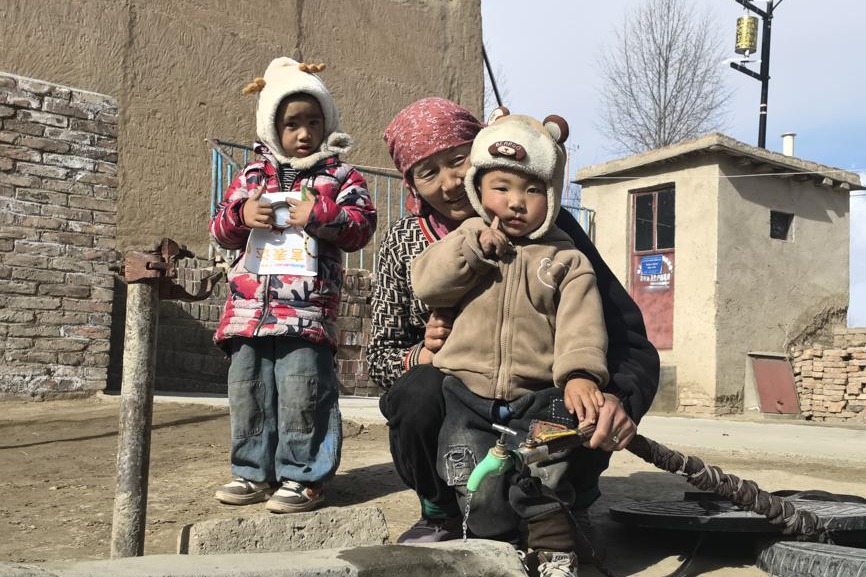Retired teachers revitalize higher education in Xinjiang
University in Harbin committed to students' development in western regions


Since the late 90s, teachers from China's developed eastern regions have been crossing to the less-developed western edge of the country to balance out the education gap.
At the Harbin Institute of Technology in Northeast China's Heilongjiang province, a group of senior teachers have made the 5,000-kilometer trek west to impart their lifelong knowledge, and promote the revitalization and development of higher education in the western regions.
Professor Ju Chunhua, a retired teacher from the School of Materials Science and Engineering at HIT, has spent the past three years of her teaching journey in the Xinjiang Uygur autonomous region.
"When I got the news that the institute was recruiting retired teachers to support western universities in July 2022, I applied without hesitation," 65-year-old Ju said.

"As a front-line teacher working at HIT for 30 years, I deeply understand the critical role teachers play in students' growth. With my experience, I felt compelled to go where I was most needed."
Despite her family members' concerns about the harsh environment, Ju was unwavering.
"Retirement doesn't mean withdrawing," she said. "Continuing to teach is my best retirement plan."
Accompanied by her husband, Ju arrived at Kashi University in Xinjiang's Kashgar city before the new autumn semester of 2022.
She took on teaching responsibilities for two courses — physical chemistry and inorganic chemistry — at the university's School of Chemistry and Environmental Science.
To help the students build a solid foundation, she spent more time explaining basic knowledge and constantly adjusted her teaching schedule.
However, daily life in Kashgar was far harsher than they expected.
"The dry climate caused frequent coughing for my husband and me," she said. "A layer of fine sand constantly covered our bedding."
Moreover, she said, later daylight hours disrupted her usual routine of early to bed and early to rise. "I spent much time adjusting myself."
What moved her most was the students' purity and enthusiasm, with their eyes burning with the thirst for knowledge.
"The students are very eager to learn," she said. "I'm always moved by their eyes in my class."
Although the students needed more patience, Ju has never lowered her strict learning standards.
To thoroughly explain a point, Ju often refined her lesson plans until late at night.
To make the abstract history of chemistry development more vivid, Ju attempted to change her teaching model with the help of artificial intelligence.
"A good teacher should have some innovative spirit," she said. "I integrated my teaching with trendy AI elements that students are interested in. They can also be exposed to the most cutting-edge teaching methods."
While guiding senior students on their graduation theses, Ju paid even more attention.
She taught them step by step, starting from database entry and keyword search.
Ju often told her students to stick to strict standards, whether in learning or in their future careers.

When students conducted experiments, Ju often found issues such as incorrect calibration, leading to data deviation, or forgetting to record units.
Ju picked up an uncalibrated measuring cylinder and told her students, "During the experiments, a small error might just lead to inaccurate data, but in the future, when you conduct pharmaceutical development or engineering testing, even a tiny error could cause significant losses.
"Many of my students have become teachers after graduation," she added. "I am happy to see they can pass on the rigorous academic attitude to more students."
During her teaching support period, Ju often attended young teachers' lectures, hoping to help them improve their teaching abilities.
She also actively participated in collective lesson planning, project application discussions, and curriculum revision work in the college, revising the teaching syllabus of courses such as physical chemistry to make them more accessible to students based on their characteristics.
In her spare time, Ju made efforts to integrate into the local community — learning a few simple phrases in Uygur from colleagues, selecting fresh beef and lamb at the bazaar, experiencing the lively atmosphere of local festivals, and even spending the holiday with local families.
Ju completed her three-year teaching support contract after the spring semester, but she applied for an extension.
"I was supposed to return to Harbin, but I failed to bring myself to leave while seeing the students' continuous progress and enthusiasm for learning," she said. "I decided to keep going with them."
At HIT, there are many senior teachers like Ju who have come out of retirement to return to the front lines of teaching, contributing to the educational cause in western China.
Bai Xiaopeng from the School of Architecture and Design is another one of them.
Bai started supporting Kashi University in September last year.
"The university has resolved all our worries, so I can work single-mindedly in Xinjiang," said 62-year-old Bai.
"The teachers from HIT's retirement office would call us every month to show concern and offer greetings. They also informed us that we could seek help to solve any problems we had."
He said that Kashi University also provided them with an excellent living environment, such as clean and tidy apartments.
"Standing on the podium means being responsible for the students," he said. "Seeing their growth and progress fills me with pride as a teacher."
So far, HIT has dispatched senior teachers 16 times to Kashi University and six times to Yanbian University in Jilin province, participating in course construction, professional development, and mentoring young teachers. Among them, five have been awarded the "Outstanding Senior Teacher" recognition by Kashi University.
Contact the writers at zhouhuiying@chinadaily.com.cn
- Retired teachers revitalize higher education in Xinjiang
- Chinese scientists develop breakthrough method for aromatic amine applications
- Mobile judicial teams ensure justice for all
- Preparations begin for new space mission
- China, CELAC vow to broaden education collaboration
- Sichuan amphibious ship returns after maiden sea trial




































